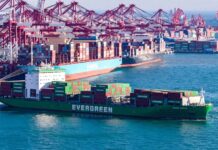The world’s first attempt at a global carbon tax for the maritime shipping industry has stalled after the United States aggressively opposed the deal, effectively delaying implementation by at least one year. The framework, designed to hold shippers accountable for greenhouse gas emissions and fund decarbonization efforts, was poised for approval by the International Maritime Organization (IMO) – the UN body regulating global shipping – before U.S. pressure derailed the process.
The Proposed Framework: A First-of-Its-Kind System
The proposed system would have levied fees on ships exceeding certain emission thresholds, channeling the revenue into a fund for cleaner fuels and decarbonization projects, particularly in developing nations. This move was supported by a majority of UN member states and the shipping industry itself, which sought a standardized regulatory environment. The industry, having enjoyed record profits – over $340 billion from 2019 to 2023 – recognized the need for consistent rules, rather than a patchwork of unilateral regulations.
U.S. Opposition: Threats and Retaliation
In April, the Trump administration withdrew from negotiations and began pressuring other nations to abandon the deal. The administration explicitly threatened tariffs, visa restrictions, port fees, and sanctions against countries voting in favor of the framework. President Trump publicly dismissed the proposal as a “global green new scam tax on shipping.”
The tactic worked. At the IMO meeting last week, Saudi Arabia called for a year-long adjournment, which passed 57-49, with 21 abstentions. This means no formal decision will be made on the net-zero framework for at least another year.
Why This Matters: A Setback for Climate Action
The collapse of the IMO negotiations underscores the fragility of international climate cooperation. The shipping industry accounts for roughly 3% of global emissions – a significant figure, given that it handles 90% of world trade. Without a unified framework, efforts to decarbonize the sector will likely remain fragmented, delaying meaningful progress.
The U.S. intervention also sets a worrying precedent for future climate negotiations, potentially encouraging similar obstructionist tactics at upcoming events like COP30 in Brazil. The delay-and-obfuscate playbook, once successful at the IMO, may now be more readily deployed elsewhere.
Local Efforts Continue, But Aren’t Enough
Despite the setback, some cities and ports are proceeding with local decarbonization initiatives, such as green shipping corridors and stricter emission standards. However, these efforts alone won’t address the industry’s core emissions problem: the massive, fuel-intensive vessels that dominate global trade.
“The way we are reacting is that cities continue to deliver a just maritime transition, despite what happened at the IMO last week,” stated Alisa Kreynes, director of the ports and shipping program at C40.
Ultimately, the failure to secure a global carbon tax represents a significant blow to climate multilateralism and highlights the challenges of coordinating international action in a politically polarized world.









































